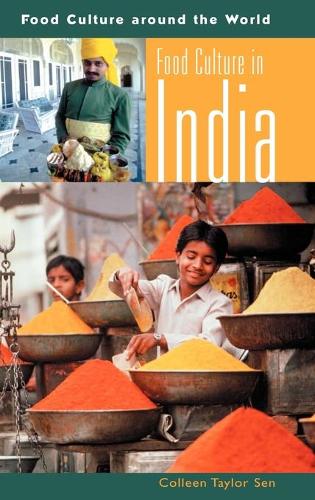
Food Culture in India
(Hardback)
Publishing Details
Food Culture in India
By (Author) Colleen Taylor Sen
Bloomsbury Publishing PLC
Greenwood Press
30th July 2004
United States
Classifications
General
Non Fiction
Cultural studies: customs and traditions
Cultural studies
National and regional cuisine / Cuisine of specific cultures or peoples
394.10954
Physical Properties
Hardback
232
Description
The extreme diversity of Indian food cultureincluding the dizzying array of ingredients and dishesis made manageable in this groundbreaking reference. India has no national dish or cuisine; however, certain ingredients, dishes, and cooking styles are typical of much of the subcontinent's foodways. There are also common ways of thinking about food. The balanced coverage found herein covers many states ignored by previous food writers. Students will find much of cultural interest here to complement country studies and foodies will discover fresh perspectives. From prehistoric times there has been considerable mixing of cultures and cuisines within India. Today, the endless variations in cuisine reflect religious, community, regional, and economic differences and histories. Sen, a noted author on Indian cuisine, consummately encapsulates the foodways in historical context, including the influence of the British period (the Raj). Among the topics covered are the restrictions of various religions and castes and the northern wheat-based vs. the southern rice-based cuisine, with an extensive review of each regional cuisine with typical meals. She characterizes the only-recent restaurant culture, with mention of Indian fare offered abroad. In addition, the Indian sweet tooth so apparent in the dishes made for many festivals and celebrations is highlighted. The roles of diet and health are also explained, with an emphasis on Ayruveda, which is gaining support in Western countries. A plethora of recipes for different regions and occasions complements the text.
Reviews
[A] timely work given the increasing interest in the culinary culture of South Asia, and of Indian cuisine in particular. Wide in scope and in ambition, this descriptively rich book constructs a panoramic view of the culinary world of the subcontinent.Sen's work is significant given that the culinary and gastronomic culture of the subcontinent is remarkably complex, comprising countless regionally differntiated cuisines and gastronomic genres, which she presents in a digestible mannerThe book is full of fascinating details about dishes that Indians take for granted as part of their heritage but never think to inquire about.[i]nvaluable. * Contemporary South Asia *
[T]he heart of ^IFood Culture in India^R lies in its cultural approach and college-level collections will consider it a value addition to any in-depth section on India. * MBR Internet Bookwatch *
Not a cookbook but an invaluable source of the why of Indian cooking is Colleen Taylor Sen's ^IFood Culture in India^R.Sen does an admirable job sketching out the history of India and its myriad food cultures. She manages to remain clear and accessible while trying not to overlook any one region, ethnicity or economic class. Dishes or foods that may seem strange or unfamiliar to the average American reader suddenly make sense when placed in the broader societal and historical context. Ingredients are explained, cooking techniques explored, everyday and holiday eating defined. The book even offers a few representative recipes. This is a work that belongs in the kitchen library of any serious lover or preparer of Indian foods. * Chicago Tribune *
[A] well researched and truly fascinating look at the culture, foods and their origins all over the sub continent, broken down by region definitely one for the shelves to come back to time and again. * Menu Magazine *
these books provide a wealth of information that would be ideal for travelers interested in the food cultures of their Asian destinations; 'foodies' in any country who desire greater background knowledge of these three ethnic cuisines; high schoolers working on food-related projects; or students in introductory college-level area studies, anthropology, or geography courses who are curious as to how history, the physical environment, agriculture, technology, religion, conceptions of health and nutrition, and other circumstances have affected and continue to affect the food cultures in three key Asian countries: China, India, and Japan. * Southeast Review of Asian Studies *
Author Bio
COLLEEN TAYLOR SEN is a regular contributor of articles on food and travel to major newspapers and magazines. She specializes in ethnic and Asian cuisines, particularly India's foodways.
